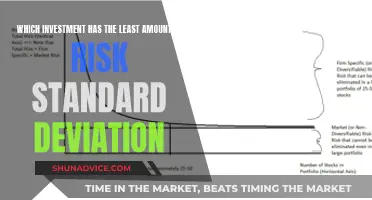
Investment managers and portfolio managers are financial professionals who help clients make investment decisions and manage their portfolios. They may work with individuals or institutions and are responsible for devising and implementing investment strategies to meet their clients' financial goals. While there are some similarities between the two roles, there are also key differences in the scope of services they offer and their specific responsibilities.
| Characteristics | Values |
|---|---|
| Definition | A financial professional who makes investment decisions for individuals or institutions |
| Education | Undergraduate degree in business, economics, finance, statistics, mathematics, or accounting |
| Skills | Data interpretation, research, analysis, financial planning, communication, risk management, portfolio construction |
| Salary | Average annual base salary in the US was $128,350 as of December 2023 |
| Working Hours | Early starts and late finishes |
| Working Pattern | Diverse, with a constant focus on financial markets and current events |
| Typical Day | Meeting with analysts, monitoring markets and current events, making trades, meeting investors |
| Media | May conduct interviews with financial media outlets |
What You'll Learn
- Investment managers devise strategies and execute trades within a financial portfolio
- Investment managers can be individuals or large firms with global offices
- Portfolio managers can take an active or passive management role
- Portfolio managers are responsible for making investment decisions about the assets of individual investors and various funds
- Portfolio managers require a bachelor's degree in finance, accounting, or economics

Investment managers devise strategies and execute trades within a financial portfolio
Investment managers are individuals or organisations that handle financial planning, investing, and portfolio management activities for their clients. They can be one-person offices or large firms with global offices.
Client portfolios can include assets in market sectors such as technology, utilities, healthcare, or energy. Investment managers consistently strategise to expand client holdings. Their fees are often based on a percentage of client assets under management (AUM). An individual with a $5 million portfolio handled by an investment manager who charges 1.5% annually pays $75,000 in fees.
Investment managers help individual or institutional investors. They are responsible for the day-to-day buying and selling of securities and assets, transaction settlement, and performance measurement. They act on behalf of their clients and make investment decisions using specific investment strategies.
Investment managers develop and implement investment strategies and manage the day-to-day trading of a portfolio. They may be responsible for managing an individual investor's assets or those of an institutional fund, such as a mutual fund.
The ability to originate ideas and employ excellent research skills are factors that influence a portfolio manager's success. They construct and manage investment or financial portfolios based on their investment style. The goal is to minimise losses while maximising returns. This requires conducting research, making adjustments to these portfolios through rebalancing at regular intervals, and communicating with investors.
Planning Investments: A Manager's Guide to Project Success
You may want to see also

Investment managers can be individuals or large firms with global offices
Investment managers handle financial planning, investing, and portfolio management activities for their clients. They help individuals or institutional investors by devising strategies and executing trades within a financial portfolio. They follow market activity closely to help dictate investment decisions for their clients and may meet with clients individually or with relevant financial team members at a company.
Investment managers typically have a bachelor's degree in a field such as financial management, economics, business, statistics, finance, mathematics, or accounting. They may also have an advanced degree, such as an MBA, or professional certifications such as the Chartered Financial Analyst (CFA) or Certified Financial Planner (CFP) designations.
The role of an investment manager can be a rewarding career option, offering high salaries, a diverse range of clients, and the opportunity to be creative and innovative in developing investment strategies. However, it can also be a high-pressure and competitive work environment, requiring a strong ability to cope with stress and a passion for the field.
Volcker Rule: Impact on Investment Management Firms?
You may want to see also

Portfolio managers can take an active or passive management role
Portfolio managers are financial professionals who make investment decisions for individual and/or institutional investors. They develop and implement investment strategies and manage the day-to-day trading of a portfolio.
Active portfolio management focuses on outperforming the market compared to a specific benchmark, such as the Standard & Poor's 500 Index. It involves more frequent trades and strives for superior returns but takes on greater risks and entails larger fees. Passive portfolio management, also known as index fund management, mimics the investment holdings of a particular index to achieve similar results. It does not have a management team making investment decisions and is often structured as an exchange-traded fund (ETF), a mutual fund, or a unit investment trust (UIT).
The choice between active and passive portfolio management depends on the market environment and the investor's goals. Active management may be more suitable in volatile and bear markets, while passive management tends to outperform in sustained bull markets. Historical performance records indicate that only a minority of active fund managers consistently beat the market.
Savings Strategies: Maximizing Output from Your Investments
You may want to see also

Portfolio managers are responsible for making investment decisions about the assets of individual investors and various funds
Portfolio managers are financial professionals who make investment decisions for individual and institutional investors. They are responsible for developing and implementing investment strategies and managing the day-to-day trading of a portfolio. This includes buying and selling securities and assets, as well as transaction settlements and performance measurements.
Portfolio managers may be responsible for managing the assets of an individual investor or those of an institutional fund, such as a mutual fund. They employ various investment strategies, including buy-and-hold, value investing, indexing, diversification, income investing, small-cap, contrarian investing, active investing, and passive investing. The goal is to minimise losses while maximising returns, conducting research, and making adjustments through rebalancing at regular intervals.
Portfolio managers have a significant influence on the returns of a fund, whether it is a closed- or open-ended fund, hedge fund, venture capital fund, or exchange-traded fund (ETF). They are typically experienced investors, brokers, or traders with strong financial management backgrounds and track records of sustained success.
Portfolio managers can take an active or passive management approach. Active portfolio managers attempt to beat average market returns through regular buying and selling, while passive portfolio managers mirror a specific market index and tend to take a more hands-off approach.
To be successful, portfolio managers need excellent research and analytical skills, communication skills, and the ability to work independently and collaborate with others. They must also have a deep understanding of financial markets, economics, and portfolio theory.
Webull Cash Management: FDIC Insurance Explained
You may want to see also

Portfolio managers require a bachelor's degree in finance, accounting, or economics
Portfolio managers are financial professionals who develop and implement investment strategies for their clients. They are responsible for making investment decisions, managing day-to-day portfolio management, and conducting research to make informed investment choices.
To become a portfolio manager, a bachelor's degree in finance, accounting, or economics is typically required. This educational background provides a solid foundation for understanding financial markets, creating investment strategies, and making sound investment decisions.
A bachelor's degree in a relevant field serves as a fundamental qualification for aspiring portfolio managers. It equips individuals with essential knowledge and skills in areas such as financial analysis, investment strategies, and economic principles. This degree can be in finance, providing a strong grounding in investment and financial concepts, or accounting, offering a deep understanding of financial reporting and analysis. Alternatively, a degree in economics can also be a suitable option, as it covers economic theories, market trends, and analytical skills, all of which are valuable for portfolio management.
Obtaining a bachelor's degree in one of these fields is the first step towards a career in portfolio management. It opens the door to entry-level positions in the financial industry, such as financial analyst roles, where individuals can gain practical experience and build a strong foundation for their future career as a portfolio manager.
While a bachelor's degree is the minimum requirement, it is worth noting that many portfolio managers choose to pursue advanced degrees, such as master's or MBA programs, to enhance their knowledge and improve their career prospects. Additionally, certifications like the Chartered Financial Analyst (CFA) or Certified Financial Planner (CFP) can further bolster one's credentials and expertise in the field.
In summary, a bachelor's degree in finance, accounting, or economics is the essential educational qualification for aspiring portfolio managers. It provides a strong foundation for understanding financial markets, creating investment strategies, and making informed decisions, setting individuals on a path towards a successful career in portfolio management.
Valuing Investment Management Firms: Strategies for Success
You may want to see also
Frequently asked questions
A portfolio manager is a financial professional who makes investment decisions for individual and/or institutional investors. They develop and implement investment strategies, manage the day-to-day trading of a portfolio, and advise on financial securities to choose.
An investment manager is an individual or organisation that handles activities related to financial planning, investing, and managing a portfolio on behalf of their clients. They can be one-person offices or large firms with global offices.
Portfolio managers tend to focus on investment portfolios and may not assess a client's overall financial goals. Investment managers, on the other hand, handle a wider range of financial topics, including financial planning, investing, and portfolio management.







